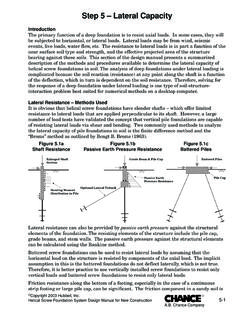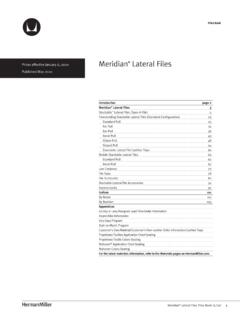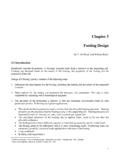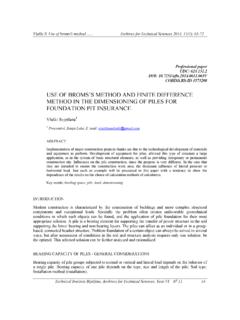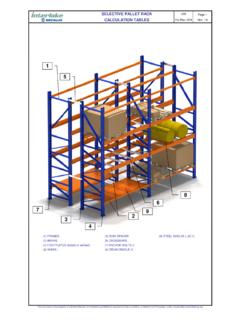Transcription of Rehabilitation from ACL Reconstruction - Professional Events
1 Rehabilitation from ACL Reconstruction Ian Horsley PhD, MCSP Lee Herrington PhD, MCSP ACL Injury Post op ACL Injury Monitoring Daily: Athlete reports numeric rating scale of pain (0-10) post each Rehabilitation session along with score at end of day & in morning on first weight bearing Athlete rates stiffness of knee on first mobilising in morning Score 0= free movement 1=some restriction to movement 2=significant restriction 3= unable move to painfully restricted Athlete measures knee circumference (around patella) on waking (1st hour of day) & in evening Patient scores Saturday Sunday Monday Tuesday Wednesday Thursday Friday NRS Pain am post rehab pm Stiffness squat stairs Swelling am pm ACL Injury Monitoring Weekly (biweekly): Knee range of movement Supine, sitting & prone Patella mobility medial glide & tilt, inferior glide (20 degrees knee flexion) scoring: free; restriction.
2 Significantly limited Quadriceps strength (handheld dynamometer) 90deg flexion QASLS score (appropriate task to phase) ACL Injury Monitoring QASLS: drop jump test QASLS: unilateral tests Single leg squat Single leg land Single hop for distance Tuck jump test DROP JUMP LANDING Participant stands on a 30cm box Jump two footed off the box landing with feet either side of a line 30cm from the box Immediately attempt to undertake a maximum vertical jump reaching up to touch a target held above the line SINGLE LEG step DOWN Participant stands on a 30cm box Instructed to step off the box onto a mark, 30cm from the box and 5cm on the contra-lateral side to the mid line SINGLE LEG HOP FOR DISTANCE Participant stands on mark at side of standard tape measure Hands resting on iliac crests Attempts to hop as far as possible staying parallel to the tape. General notes All landings for single leg step down and single leg hop for distance must be held for 3 seconds, emphasis during task instruction must be placed on this Evaluate all landings using the QASLS scoring system For single leg hop for distance also include the distance hopped and the leg length Position camera a minimum of 2m from the landing position, zoom in to maximise the size of the subject within the frame Allow the subject a minimum of two practice attempts (continuing until they are able to do tasks appropriately)
3 Then record a single attempt after this ACL Injury Monitoring Single leg squat step up, side lower, forward lower QASLS score Squat 1 ACL Injury Monitoring Drop jump vertical Modified LESS score Drop ACL Injury Monitoring step off, hop off, single hop for distance QASLS score step 1 Hop 1 TUCK JUMP TEST Subjects stand in a 30cm box marked on floor Undertake tuck jump continuously for 10 seconds Must attempt to raise the knees above the hips each time and land and take off within the box ACL Injury Monitoring Tuck jump test Tuck S1 Subject 1 Subject 2 CROSS OVER HOP TEST Subject stands by two parallel lines 20cm apart extending at least 5m Undertakes four consecutive hops without pause crossing the grid lines each time. ACL Injury Monitoring Hop tests One leg hop for distance 80-90% height (males) 70-80% height (females) (Ellenbecker 2001) Cross over hop; 4 hops mean (Goh & Boyle, 1997, Hopper et al 2003; Munro & Herrington, 2009.)
4 Reid et al 2007) Hop type Male (% leg length) Female (% leg length) Single hop (+ ) (+ ) four hop (+ ) (+ ) Cross-over hop (+ ) (+ ) Motor Learning Single-leg stance on unstable platform Single-leg squat Single-leg hop for distance (Walking) lunges Double-leg squat STAR EXCURSION BALANCE TEST Subject stands on leg to be tested in centre of star Instructed to reach as far as possible down the line without taking undue support from the reaching leg or stepping over onto that leg 4 practices then test 5 repetitions ACL Injury Monitoring Star excursion balance test (SEBT) Directions: Anterior (quads) Posterior (hams) Medial & lateral (ACL) Direction Reach Distance (% leg length) Male Female Anterior 80-92 73-92 Antero-medial 82-91 82-91 Medial 87 91 87 91 Postero-medial 87-107 87-99 Posterior 85-88 85-88 Postero-lateral 81-106 81-93 Lateral 71-76 71-76 Antero-lateral 73-78 73-78 ACL Injury Block 1: Post op recovery phase ACL Injury Post op recovery phase Aims.
5 Overcome the effects of the operation regain range of movement regain muscle activation control effusion achieve normal walking gait ACL Injury Post op recovery phase Typical activities Effusion control Compression, game ready etc Muscle activation Compex & superimposed twitch Range of movement Patella & tibiofemoral Gait re-education Limb loading ACL Injury Target criteria to be achieved prior to progression to progressive limb loading activity Full quadriceps activation (SLR no lag x10) Range of movement 0-120 degrees (minimum) Minimal am effusion (<1cm patella) Minimal change effusion with activity (<1cm patella) Bilateral squat to parallel (thighs relative to floor) even weight bearing Gluteal activation Bilateral short lever bridge X10 reps to neutral hip extension Hamstring activation 0-90 deg knee flexion in standing on the uninjured limb Bilateral long lever (straight leg bridge on chair:30cm) X10 reps to neutral hip extension Function: Normal symmetrical gait Static cycling ACL Injury Block 2: Progressive limb loading activities ACL Injury Progressive limb loading activity Aims: progressing athlete from bilateral weight bearing activities to full unilateral weight bearing activities undertake limited load acceptance activities (bilateral landing & jogging) both in closed skill block practice manner.
6 Progress strength training & work capacity of key lower limb muscles. ACL Injury Progressive limb loading activity Typical activities Muscle strengthening & work capacity training Leg press (squat), mid thigh pull, heel raisers Open chain quads (120-60 degree) & hamstrings Bridging; extended & flexed knee Static movement dissociation Static balance; multi-angle & vestibular Movement dissociation; T drills, SEBT Dynamic movement control (closed chain) SLS, step up/down, forward & side lower, lunge Closed skill block practice ACL Injury Progressive limb loading activity Typical activities Bilateral load acceptance Closed skill block practice Criteria bilateral leg press-squat Single leg balance stability challenge 60deg flex Cardiovascular training Cycle, cross trainer, jog (alterG-treadmill) ACL Injury Target criteria to be achieved prior to progression to unilateral load acceptance activity Single leg squat to 90 (alignment control x10 reps.)
7 QASLS score 0-1) Single leg stand 5, 45 & 90 knee flexion (10 second hold) on airex pad SEBT Ant & Post symmetrical Med & Lat <15% LSI Single leg press (10RM) 0 to 90 deg knee flexion Bilateral drop jump test [QASLS score 0-1] from 30cm box Tuck jump test (score <3) Gluteal muscle work capacity Unilateral short lever bridge on box (hip 45deg) (x25+ each leg no greater than 5 rep difference between sides) Hamstring muscle work capacity Unilateral long lever on box (hip 45deg) (x25+ each leg no greater than 5 rep difference between sides) Calf muscle work capacity Unilateral heel raise (x25+ no greater 5 rep difference between sides) Full range of movement Minimal activity related effusion (<1cm change patella) Function Straight line jogging treadmill (8-10min/mile) Straight line running (6-8min/mile) Stair ascent & descent (30cm); alignment control symmetry ACL Injury Block 3: Unilateral load acceptance activity ACL Injury Unilateral load acceptance activity Aim progress athlete from bilateral load acceptance activities to full unilateral load acceptance activities in multiple planes of movement Including combination of closed & open skill practice progress strength & force development training & work capacity of key lower limb muscles ACL Injury Unilateral load acceptance activity Typical activities Muscle strengthening & work capacity training Unilateral load acceptance activities in multiple planes & reactive landings situations Bilateral multi-plane & unilateral single plane plyometric activities ACL Injury Target criteria to be achieved prior to progression to Sport specific task training activities SEBT symmetry & within norms Single leg (hop) land (alignment control.
8 QASLS score 0-1) Single leg hop for distance Forward & side hop from 30cm box 10 RM Single leg press > 0 to 90 deg knee ROM 10 rep leg press to 90 degrees within 5-10% of contralateral leg PBs no more than 5-10% down on pre injury level 3-6 RM of selected lower limb exercises, If previous PB Squat = 150 kg x 5, then 140 kg Squat x 5 with good form is a pass. Tuck jump test (score 0-1) Cross over hop LSI <5% Isokinetic extensors 300%BW total work 60deg/sec (average over 5 rep) Isokinetic Peak Eccentric F > 120-130% of Peak Concentric F at 60 deg/sec No breaks in Isokinetic Curve during 60 deg / sec ROM Rate of force development; eg vertical hop test (Myer et al 2012 Am J Sports Med) LSI <5% ACL Injury Block 4: Sport specific task training activities ACL Injury Sport specific task training activities Aim Improving athlete s work capacity in ability to undertake unilateral load acceptance activities in multiple planes of movement with a reactive random element Develop athlete s ability to carry out specific multi-directional running & landing tasks which are aligned to needs of their sport, along with any other sport skill based tasks ACL Injury Sport specific task training activities Typical activities Muscle strengthening & work capacity training Unilateral load acceptance activities in multiple planes & reactive landings situations (with fatigue element) Sports specific aligned running agility tasks Sports specific aligned skill tasks ACL Injury Target criteria to be achieved prior to progression to unrestricted sport specific training Following fatiguing task (sport specific intensity-duration)
9 SEBT symmetry & within norms Single leg (hop) land (alignment control; QASLS score 0-1) Single leg hop for distance (LSI < 5%, & <5% pre op score) Forward & side hop from 30cm box (alignment control; QASLS score 0-1) Running speed flying run (10m) through Optojump system & speed gates, L v R side symmetry of contact and flight times within 5-10% Agility run time symmetrical (modified T or alternate sport specific) < 10% preop time Function sport specific tasks with alignment control under random practice & fatigue scenarios (video analysis) Case study Back to Performance 859095100105110115 DecJanMarchAprilJuneLSI LSI for Hop Tests LSI SHLSI THLSI XOLSI = Injured or Non Dominant Limb Score Non-Injured or Dominant Leg Score x 100 012345678 DecJanMarchAprilJuneTuck Jump & QASL Scores SL Landing LeftSL Landing RightTuck JumpTuck Jumps December 2013 June 2014 On Court Technical Coach Led within Physio Restrictions ACL Injury Unrestricted sport specific training Thank you @Back_in_Action Physio matters Podcast
